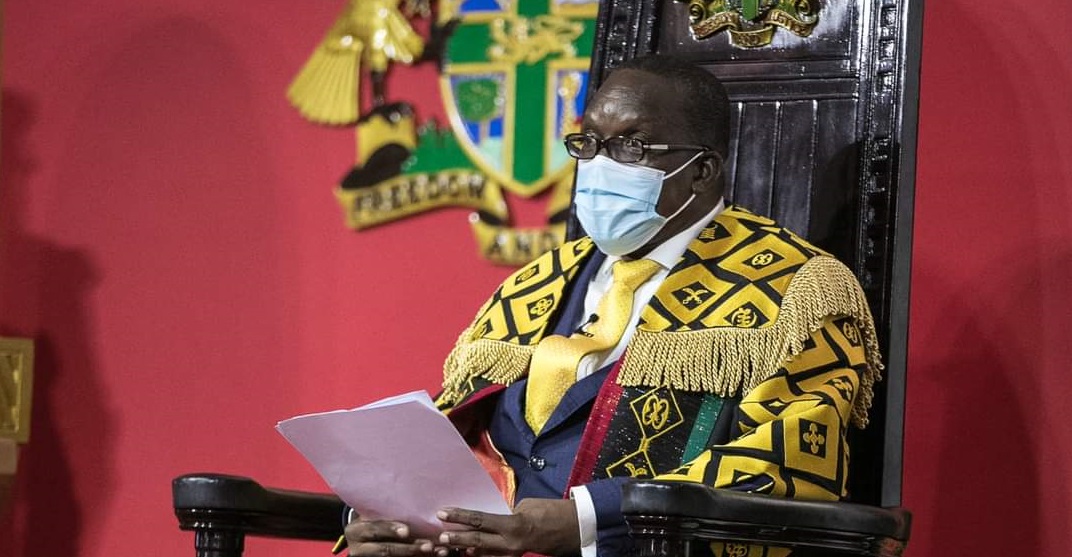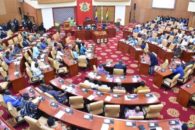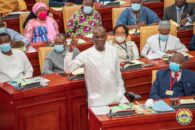The Speaker of Parliament, Rt. Hon. Alban Sumana Kingsford Bagbin, has cautioned the country’s lawmakers that under no circumstances could they evade service of court when the legislature is not in Session.
To the Speaker, the immunities being enjoyed by himself, Clerk of Parliament and Members of Parliament (MPs) are not absolute, stressing that any Member caught on the wrong side of the law once served by a court of competent jurisdiction must avail himself to the court.
“I must bring to your attention that the immunity enjoyed by the Speaker, Members of Parliament, and the Clerk of Parliament are not absolute anytime, anywhere, and any day. As such, when Parliament is not in Session or a Member of Parliament is not on his way to, attending at or returning from the business of Parliament, such a member may be served a court process and may appear as a witness in a court proceeding”, he ruled.
He added “It follows therefore that while Parliament is not in Session or the Speaker has not certified that a Member or Clerk to Parliament is attending to the business of Parliament, a Member of Parliament may not evade service of court process or refuse to appear as a court summoned witness in a court proceeding. Any such act would amount to a violation of Articles of 117 and 118 of the Constitution and same would not be encouraged in this House. Let me emphasize again that Parliamentary proceedings include Parliamentary Committee meetings and activities”.
However, much as the directive of the Speaker provides some free space for the Judiciary to operate, such comes with a caveat. That where a Member is served a process from a court or place out of Parliament while the House is on recess, the Member shall accept the process and immediately inform the Speaker, whilst taking the necessary action arising out of the service.
Further to that, the Court or place out of Parliament must also inform the Speaker of the service of the process.
“This is to give opportunity for the Speaker to exercise the responsibility imposed on him or her by Article 118(2)”, he underscored.
Rt. Hon. Bagbin made these observations when he read out a twenty-six bullet point statement on matters arising out of the enforcement of articles 117 and 118 of the 1992 Constitution at a sitting on Wednesday, June 9, 2021.
His comment was in response to recent attempts by some Members of Parliament to decline or evade service of court processes and documents while Parliament was on recess and the Hon. Members were not on their way to, attending at or returning from any proceedings of Parliament.
The situation has led to some confrontation with court process servers while some Justices have had to resort to the issuance of substituted service orders to ensure the smooth adjudication of cases before them.
Some MPs have been arraigned before Court and charged with various offences without any notice to the Speaker.
To the Rt. Hon. Bagbin, “this conduct is an aberration and should not be repeated”.
Making references to Article 117 and 118 of the 1992 Constitution, the Speaker said the separation of powers must be respected, imploring on the MPs to give their utmost respect to the Judiciary.
Article 117 of the 1992 Constitution states that “Civil or criminal process coming from any court or place out of Parliament shall not be served on, or executed in relation to, the Speaker or a Member or the Clerk to Parliament while he is on his way to, attending at or returning from, any proceedings of Parliament”.
Article 118 (1) of the 1992 Constitution also provides that “Neither the Speaker, nor a Member of, nor the Clerk to Parliament, shall be compelled, while attending to appear as a witness in any of court or place out of Parliament”. Clause (2) of Article 118 further provides that “The certificate of the Speaker that a Member or the Clerk is attending the proceedings of Parliament is conclusive evidence of attendance at Parliament”.
To the Speaker, the provisions of the 1992 Constitution highlighted above have unfortunately in some instances been disregarded by some court officials. That aside, he said while the enforcement and application of the provisions in Article 118 of the 1992 Constitution have largely been without incident, the enforcement and application of Article 117 has been fraught with challenges.
To ensure that the situation is curtailed, Rt. Hon. Bagbin said he in a letter dated February 19, 2021, wrote to the Chief Justice and Head of the Judicial Service to strongly register his reservations with the attempt by officers of the Judicial Service to serve court processes on some Members of Parliament, the Clerk to Parliament and the Speaker of Parliament while these Office holders were attending to the proceedings of Parliament at the precincts of Parliament when the House was in Session.
The letter he added, was duly acknowledged by the Chief Justice who assured him of addressing the issue.
“The Chief Justice went further to assure me of his immediate action to halt the practice. He proceeded to do just that in a circular and provided me with a copy of the circular which directed that the provisions in Articles 117 and 118 be respected by all Judges and Court Officers”, he said.
To ensure that the occurrence is not repeated, Rt. Hon. Bagbin provided some guidance to the House. Key amongst them include:
- That when Parliament is in session, there is a presumption, in the normal course of business, that a Speaker, Member of Parliament or Clerk to Parliament is on his way to, attending at or returning from, proceedings of Parliament and cannot be served a process from any court or place out of Parliament whilst in motion.
- That when a Speaker, Member of Parliament or Clerk to Parliament is in the precinct of Parliament, there is a presumption that the Speaker, Member of Parliament or Clerk to Parliament is attending to a proceeding of Parliament and cannot be served a process from any court or place out of Parliament.
- That when Parliament is on recess, the presumption can be said to be rebuttable and Members of Parliament may be served a process from any court or place out of Parliament whether the Member is in the Constituency, in the private office outside Parliament or at his residence.
- That when Parliament is on recess, and a Speaker, Member of Parliament or Clerk to Parliament is in the precinct of Parliament, there is a presumption that the Speaker, Member of Parliament or Clerk to Parliament is attending to the business of Parliament and cannot be served a process within the precinct of Parliament.
- That where a Member is served a process from a court or place out of Parliament while the House is on recess, the Member shall accept the process and immediately inform the Speaker, whilst taking the necessary action arising out of the service. The Court or place out of Parliament must also inform the Speaker of the service of the process. This is to give opportunity for the Speaker to exercise the responsibility imposed on him/her by Article 118(2).
- Where a Member is attending to business of Parliament such as Committee meetings or activity, during the recess and the Member is served a process from a court or place out of Parliament, the Member may respectfully direct the service of the process through the Speaker.
- Where the official insists on serving the process on the Member, the Member may notify the Speaker of the service, and where the Speaker has ascertained that the Member is attending to the business of Parliament, the Speaker will direct that the process be returned to the Registrar of the Court in compliance with Article 117 of the Constitution.
- Where a Member accepts service of a process and has entered appearance, the Member is said to have become a party to an action and will thus not be covered by the immunities provided under Articles 117 and 118 of the 1992 Constitution as rightly held by the Learned Justice of the High Court in the case of The Republic vs. Mahama Ayariga & Others 2019 (unreported).
“Despite this ruling, a practice is developing between the Judiciary and the Legislature, out of mutual respect, where the Courts accept requests from Parliament to schedule hearings on dates and times that will not clash with a plenary sitting of Parliament; and (where) on a number of occasions, the Courts have accepted a letter from Mr. Speaker for adjournment of matters pending in Courts, subject to the convenience of the Court, due to the fact that Hon. Members are attending to critical or urgent business of the House, This practice, I believe will continue to guide this grey area of the Constitution”, he noted.
He added “Hon. Members, I urge you all to accord the members of the Judiciary and the Judicial Service the outmost respect, decency and decorum they deserve. It has taken a long period of history, full of lessons, and effort to achieve a cordial and harmonious relationship between the Judiciary and the Legislature. We should treasure that cordial relationship and desist from jeopardizing it with actions or inactions which are not well thought through”.




